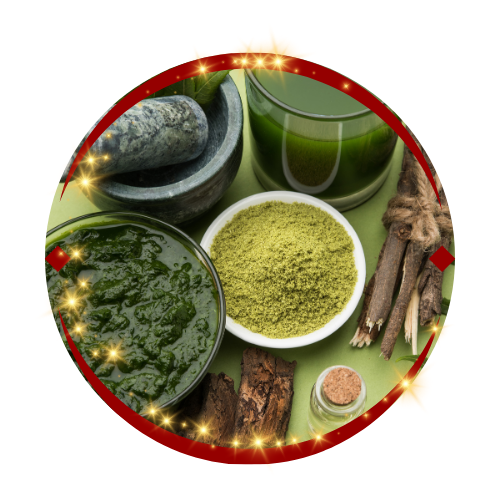Description:
- Neuro-psychiatric disorders Jyotishmati has been described to be an excellent medhya rasyana in ayurveda.
- This action has been confirmed by scientific research, too. Studies show that Jyotishmati improves cognitive functions.
- On this basis, it could be used in the management following neuro-psychological disorders –
- Mental depression – Jyotishmati has been found to possess anti-depressant activity. On this basis, it could be used in the management of mental depression.
- It probably acts by improving the production of dopamine, serotonin, and nor-epinephrine.
- Anxiety – Jyotishmati has been found to possess anxiolytic activity.
- On this basis, it could be used in anxiety neurosis, mental stress, etc.
- Stroke – Jyotishmati has been described as vata-hara (neurotropic), vahni-prada (Metabolic stimulant), ruksha (anti-lipid), and rakta-pittadam (anti-coagulant) in ayurveda.
- On this basis, it could be used in the management of stroke, paralysis, hemiparesis, etc.
- Poor cognitive functions – In ayurveda, Jyotishmati has been described to be Jyotishmati has been found to possess cognition-enhancing activity.
- On this basis, it could be used in patients with poor memory, forgetfulness, slow learning, poor concentration, ADHD, etc.
- Epilepsy – Jyotishmati has been found to possess anti-convulsive activity. On this basis, it could be used as a supportive drug in the management of various convulsive disorders, including epilepsy.
- Psychosis – Jyotishmati has been found to possess anti-psychotic activity.
- On this basis it could be used as a supportive drug in the management of psychosis.
- Neuropathies – Jyotishmati has been found to possess neuro-protective activity.
- On this basis it could be used in the management of neuropathies resulting from diabetes, toxins, alcohol, etc.
- Endocrine disorders Jyotishmati has been described to be an excellent vata-hara (Useful in neuro-endocrine disordesr) and vahni-prada (Metabolic stimulant) in ayurveda.
- On this basis, it could be used in the management following endocrine disorders –
- Hypothyroidism – Jyotishmati has been found to possess thyro-stimulant activity.
- On this basis, it could be used in the management of hypo-thyroidism.
- Diabetes – Jyotishmati has been found to possess anti-diabetic activity. On this basis, it could be used in the management of diabetes, especially the diabetic neuropathy.
- Obesity – Jyotishmati has been found to increase muscle metabolism and thus increase fat breakdown.
- On this basis, it could be used in the management of obesity.
- Dyslipidemia – Jyotishmati has been described as vahni-prada (Metabolic stimulant) ruksha (anti-lipid) in ayurveeda. Studies reveal that it lowers the raised lipids (Cholesterol and triglycerides) in the blood.
- On this basis, it could be used in the management of dyslipidemia.
- Cardiovascular disorders Jyotishmati has been described as vahni-prada (Metabolic stimulant), ruksha (anti-lipid), and rakta-pittadam (anti-coagulant) in ayurveeda.
- On this basis, it could be used in the management of following cardiovascular disorders –
- CAD – Clinically, Jyotishmati has been found to be quite effective in the management of CAD – angina.
- It probably acts by improving blood supply to the heart muscle, lowering raised blood lipids, and antioxidant activity.
Note: The item is guaranteed to be authentic. Product images are purely illustrative. Images/packaging/labels may vary from time to time due to changes in the manufacturing batch and location of the manufacturer. The product description is provided solely for informational purposes and may include additional ingredients.
Dr. Vasishth's Jyotishmati - 30 tabs

Ready to ship in 3-4 business days

SECURE ORDERING

QUALITY PRODUCTS

SATISFACTION GUARANTEED

EASY RETURNS

Sep 18
Order placed
Sep 21 - Sep 23
Order dispatches
Sep 26 - Sep 28
Delivered!
Description:
- Neuro-psychiatric disorders Jyotishmati has been described to be an excellent medhya rasyana in ayurveda.
- This action has been confirmed by scientific research, too. Studies show that Jyotishmati improves cognitive functions.
- On this basis, it could be used in the management following neuro-psychological disorders –
- Mental depression – Jyotishmati has been found to possess anti-depressant activity. On this basis, it could be used in the management of mental depression.
- It probably acts by improving the production of dopamine, serotonin, and nor-epinephrine.
- Anxiety – Jyotishmati has been found to possess anxiolytic activity.
- On this basis, it could be used in anxiety neurosis, mental stress, etc.
- Stroke – Jyotishmati has been described as vata-hara (neurotropic), vahni-prada (Metabolic stimulant), ruksha (anti-lipid), and rakta-pittadam (anti-coagulant) in ayurveda.
- On this basis, it could be used in the management of stroke, paralysis, hemiparesis, etc.
- Poor cognitive functions – In ayurveda, Jyotishmati has been described to be Jyotishmati has been found to possess cognition-enhancing activity.
- On this basis, it could be used in patients with poor memory, forgetfulness, slow learning, poor concentration, ADHD, etc.
- Epilepsy – Jyotishmati has been found to possess anti-convulsive activity. On this basis, it could be used as a supportive drug in the management of various convulsive disorders, including epilepsy.
- Psychosis – Jyotishmati has been found to possess anti-psychotic activity.
- On this basis it could be used as a supportive drug in the management of psychosis.
- Neuropathies – Jyotishmati has been found to possess neuro-protective activity.
- On this basis it could be used in the management of neuropathies resulting from diabetes, toxins, alcohol, etc.
- Endocrine disorders Jyotishmati has been described to be an excellent vata-hara (Useful in neuro-endocrine disordesr) and vahni-prada (Metabolic stimulant) in ayurveda.
- On this basis, it could be used in the management following endocrine disorders –
- Hypothyroidism – Jyotishmati has been found to possess thyro-stimulant activity.
- On this basis, it could be used in the management of hypo-thyroidism.
- Diabetes – Jyotishmati has been found to possess anti-diabetic activity. On this basis, it could be used in the management of diabetes, especially the diabetic neuropathy.
- Obesity – Jyotishmati has been found to increase muscle metabolism and thus increase fat breakdown.
- On this basis, it could be used in the management of obesity.
- Dyslipidemia – Jyotishmati has been described as vahni-prada (Metabolic stimulant) ruksha (anti-lipid) in ayurveeda. Studies reveal that it lowers the raised lipids (Cholesterol and triglycerides) in the blood.
- On this basis, it could be used in the management of dyslipidemia.
- Cardiovascular disorders Jyotishmati has been described as vahni-prada (Metabolic stimulant), ruksha (anti-lipid), and rakta-pittadam (anti-coagulant) in ayurveeda.
- On this basis, it could be used in the management of following cardiovascular disorders –
- CAD – Clinically, Jyotishmati has been found to be quite effective in the management of CAD – angina.
- It probably acts by improving blood supply to the heart muscle, lowering raised blood lipids, and antioxidant activity.















